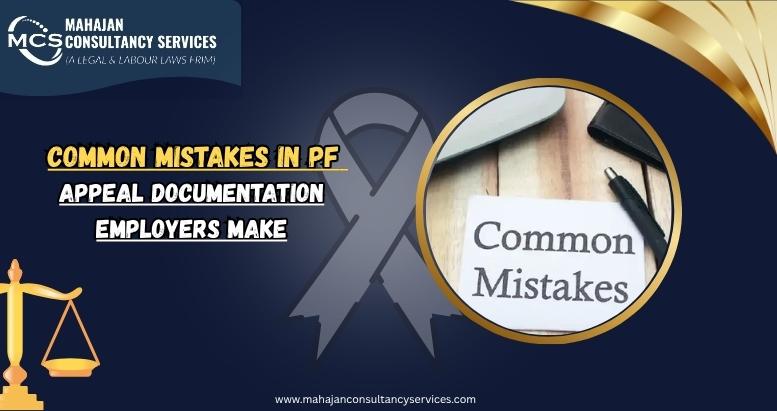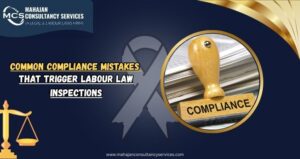Employee Provident Fund (PF) compliance is a critical statutory obligation for Indian employers. While making PF contributions is mandatory, many employers face disputes or discrepancies with the Employees’ Provident Fund Organisation (EPFO) that necessitate filing appeals. PF appeals allow employers to resolve issues such as incorrect PF deductions, delayed contributions, or misclassification of employees.
However, improper documentation is one of the main reasons PF appeals get rejected or delayed. Employers often assume that assembling basic PF records is enough, but EPFO scrutiny is strict. Small errors can lead to prolonged processing times, interest penalties, or even legal challenges. Mahajan Consultancy, a leading corporate legal services provider in India, advises employers on proper documentation to avoid these pitfalls.
Understanding PF Appeal Documentation
A PF appeal is a formal request to the EPFO to review, correct, or waive issues related to PF contributions or compliance. Documentation is central to these appeals because it provides evidence supporting the employer’s claims.
Proper documentation typically includes:
- PF payment records and challans
- Employee attendance and wage records
- Provident fund calculation sheets
- Authorization letters and signatures
- Communication with EPFO regarding discrepancies
The more accurate and complete the documentation, the higher the chances of a successful appeal.
Common Documentation Mistakes Employers Make
1. Incomplete or Missing Documents
One of the most frequent mistakes is submitting incomplete records. Missing payment challans, unsigned forms, or incomplete employee details can trigger automatic rejection.
For example, if an employer claims delayed PF deposit was due to an accounting error but fails to provide bank statements or contribution receipts, EPFO may deny the appeal. Employers must ensure every supporting document is attached and cross-verified for completeness.
2. Incorrect Employee Details
PF appeals often fail due to mismatched employee information. Common issues include:
- Incorrect Universal Account Number (UAN) entries
- Misspelled employee names
- Wrong PF member IDs
- Discrepancies in dates of joining or leaving
Even minor inconsistencies can raise doubts about the authenticity of the appeal. Employers should cross-check all employee details with EPFO records before submission.
3. Late Submission of Appeals
EPFO sets strict timelines for submitting appeals. Late filing, even by a few days, can result in automatic rejection. Employers sometimes underestimate the processing time needed to gather and verify documentation.
For instance, an employer waiting until the last day to collect attendance records or signed forms may miss the deadline. Mahajan Consultancy recommends preparing appeal documentation well in advance to allow time for review and verification.
4. Incorrect PF Calculations
Many appeals involve disputes over PF contributions. Errors in calculations, such as incorrect wages, contribution percentages, or interest computations, can compromise the appeal.
Employers sometimes assume automated payroll systems are error-free. However, human oversight or system glitches can result in incorrect data. Rechecking all calculations and reconciling with EPFO records is essential before filing.
5. Insufficient Evidence of Payment Delays or Corrections
When seeking a waiver of interest or penalty, employers must provide detailed evidence of why delays occurred. Common mistakes include:
- Submitting vague explanations like “system error” without proof
- Failing to attach bank statements or internal approval records
- Not documenting communication with EPFO before filing
Without clear evidence, EPFO may reject the appeal, assuming negligence on the employer’s part.
6. Improper Authorization
PF appeal forms require authorized signatories to validate the documents. Employers sometimes submit forms signed by unauthorized personnel, which leads to invalidation.
Always ensure that the signatory is listed as authorized in EPFO records, and include supporting board or management resolutions if required.
7. Lack of Clarity in Appeal Explanation
EPFO officers review hundreds of appeals daily. Vague or poorly drafted explanations of the issue reduce credibility.
For example, a statement like “PF contribution mismatch” is insufficient. The explanation should clearly outline:
- The nature of the discrepancy
- Dates and amounts involved
- Corrective measures taken
- Supporting documents attached
Clear and precise explanations improve the likelihood of a favorable decision.
8. Submitting Outdated Forms
EPFO periodically updates appeal forms and formats. Using old forms or outdated versions can result in automatic rejection. Employers should always verify the latest format on the official EPFO website before submission.
9. Ignoring EPFO Communication
After submitting a PF appeal, EPFO may request additional documents or clarifications. Many employers ignore follow-up requests, causing delays or rejection.
Timely response to EPFO queries is crucial. Mahajan Consultancy advises setting up a dedicated compliance team or liaison to handle all correspondence promptly.
10. Failure to Maintain Internal Records
Even if the appeal is rejected, employers may need to defend their position in subsequent legal proceedings. Poor internal record-keeping makes this difficult. All PF-related records, including payroll, attendance, and contribution proofs, should be archived for at least five years.
Maintaining organized records reduces the risk of repeated mistakes and ensures that future appeals are supported by clear evidence.
Best Practices to Avoid PF Appeal Mistakes
1. Cross-Check All Employee Data
Verify UAN, PF member IDs, names, and dates of joining or exit against EPFO records. Consistency reduces the risk of errors.
2. Verify Contribution Records
Ensure that PF calculations match both payroll data and EPFO remittance details. Reconcile discrepancies before filing the appeal.
3. Gather Complete Documentation
Collect all relevant supporting documents such as payment receipts, attendance records, and correspondence with EPFO. Incomplete documentation is a primary cause of rejection.
4. Ensure Proper Authorization
Confirm that the appeal is signed by the authorized signatory. Include board resolutions or management approvals if required.
5. Submit Before the Deadline
Start preparing the appeal early to ensure timely submission. Allow time for internal verification and corrections.
6. Provide Clear and Detailed Explanations
Explain the issue with precision, including amounts, dates, and corrective actions. Attach all supporting evidence to substantiate claims.
7. Maintain Internal Records
Archive all payroll, attendance, and contribution records. Organized documentation supports appeals and reduces future disputes.
8. Engage Professional Assistance
Working with corporate legal experts like Mahajan Consultancy ensures that appeals are properly drafted, compliant with EPFO guidelines, and backed by strong supporting evidence.
The Mahajan Consultancy Advantage
Mahajan Consultancy helps employers minimize PF appeal rejections by providing:
- Expert review of all PF-related documents
- Assistance in reconciling payroll and EPFO records
- Drafting clear and precise appeal explanations
- Ensuring proper authorization and submission compliance
- Guidance on responding to EPFO follow-ups promptly
By leveraging their expertise, businesses reduce the risk of errors and enhance the chances of successful PF appeal resolution.
Conclusion
PF appeals are an essential tool for employers to correct discrepancies, waive penalties, or resolve disputes with EPFO. However, common documentation mistakes often result in rejection or delays. Incomplete records, incorrect employee details, miscalculations, vague explanations, and improper authorization are frequent pitfalls.
Employers who adopt best practices such as cross-checking data, submitting complete documentation, providing detailed explanations, and engaging professional support are better positioned to achieve favorable outcomes. Mahajan Consultancy’s legal expertise ensures that PF appeals are prepared accurately, improving compliance, reducing risk, and saving valuable time for businesses.
FAQs
- What is a PF appeal?
A PF appeal is a formal request to EPFO to review, correct, or waive issues related to PF contributions or compliance. - Why do PF appeals get rejected?
Common reasons include incomplete documents, incorrect employee details, miscalculations, and late submissions. - Who can sign a PF appeal?
Only authorized signatories listed with EPFO or approved by management can sign the appeal. - Can late submissions still be considered?
Typically, EPFO enforces strict deadlines. Late submissions are often rejected unless exceptional circumstances are documented. - What documents are needed for a PF appeal?
Documents include PF payment receipts, payroll records, employee details, authorization letters, and any relevant correspondence with EPFO. - How can miscalculations be avoided?
Double-check payroll calculations against PF remittance records and reconcile discrepancies before filing. - Is professional help necessary for PF appeals?
While not mandatory, professional assistance improves accuracy and reduces rejection risk. - How long should employers maintain PF records?
Records should be retained for at least five years for reference in future appeals or audits. - What should employers do if EPFO requests additional documents?
Respond promptly and provide the requested documents to avoid delays or rejection. - How can Mahajan Consultancy help with PF appeals?
They assist with documentation review, appeal drafting, compliance verification, and timely submission to EPFO.




